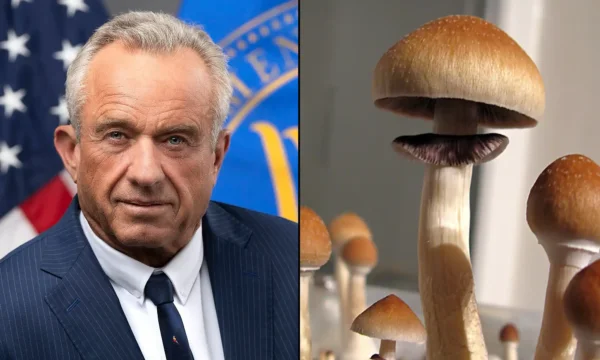Wisconsin GOP Assembly Speaker Hopes For ‘Consensus’ On Medical Marijuana, But Says New Senate Bill Is ‘Too Broad’
Wisconsin medical marijuana legalization is stuck in a fluorescent-lit purgatory, somewhere between a prayer and a punchline. The state’s Assembly speaker, Robin Vos, says he wants “consensus,” like a diner cook promising a perfect over-easy egg if you just give him one more minute. Then he turns around and calls the Senate’s new medical cannabis bill “way too broad,” the kind of thing that might let real dispensaries pop up like Friday fish fries—and he swears that’s a bridge too far. He’s been searching for yes for five or six years, he says, but his map keeps leading back to maybe. In the last round, he floated a stripped-down, state-run model—five or six dispensaries for the whole state, charity over commerce, the sort of system that treats access like a ration line. That version blew up on the launchpad. Now the Senate wants private licenses and a more recognizable medical market. Vos calls it “unlikely” to survive the Assembly. The crisis here isn’t marijuana so much as bandwidth: how much change Wisconsin can stomach at once, and who gets to plate it.
Here’s what’s on the table: Senate President Mary Felzkowski and her colleagues are pushing a bill that—if it echoes her previous version—would let doctors recommend cannabis for a tight list of conditions: cancer, seizure disorders, PTSD, multiple sclerosis, and a few other brutal companions. No smokables, no home grow. Just oils, tinctures, pills, topicals. The architecture leans medical, clinical, pharmaceutical. It nods to patient dignity while keeping both hands on the brake. Felzkowski, a cancer survivor, frames it as basic decency and a chance for small businesses to play by clear rules without torching public safety. But inside the Capitol, the split is surgical. Some Republicans see any dispensary as a gateway to adult use and cultural rot; some Democrats wonder why a wounded veteran shouldn’t be able to light a joint on his own porch. The truth, like most late-night truths, sits between the bar rail and the neon: patients need relief, but politics prefers purity tests. You can glimpse a saner reality by looking east, where a bipartisan plan would let the gravely ill receive cannabis in clinical settings—read up on Terminally Ill Patients Would Be Able To Use Medical Marijuana In Pennsylvania Hospitals Under New Bipartisan Bill—a reminder that “medical” means very little unless you can actually access the medicine where care happens.
The political theater is set against numbers so blunt they feel like a bar tab at last call. Two-thirds of Wisconsin voters support legalization. Rural support clocks in near that mark too. And while lawmakers argue over definitions, residents drive south, fill shopping bags in Illinois, and leave $36 million in tax revenue behind for their neighbors—on more than $121 million in border-crossing cannabis purchases in a single year. State bean counters say a regulated market here could net roughly $170 million annually. You don’t need an economics degree to hear the register ding. Meanwhile, Republican leaders admit the marijuana debate isn’t going away because, frankly, marijuana isn’t going away. Folks already buy gummies at gas stations, talk terpenes at supper clubs, and chase sleep with tinctures the way their parents chased it with bourbon. We know from lifestyle data that substitution happens; alcohol yields when THC steps in, and that has its own public health and policy ripple effects—see the evidence in Most People Who Drink THC-Infused Cannabis Beverages Reduce Their Use Of Alcohol, Survey Shows. All this suggests demand isn’t theoretical; it’s lived reality, waiting for the law to catch up.
Zoom out, and the Wisconsin fight becomes a postcard from the American contradiction. One would-be governor on the right flirts with being “open” to legalization while offering few specifics. The current governor, a supporter of reform, can’t get a ballot question past the barricades. The result is legislative limbo: budget proposals get stripped, amendments die on the vine, and compromise bills vanish before the vote. Even beyond the budget spreadsheets and health claims, cannabis policy keeps colliding with other American obsessions—guns, for instance—now bumping up against federal forms and constitutional questions that may demand a national answer; keep an eye on Supreme Court Asked To Take Up Case Of Man Prosecuted For Lying About Marijuana Use While Buying Guns. And if you really want to feel the stakes, step off our shores. There are corners of the world where a few grams can cost a life, an obscene reminder that what we banter about as “policy” elsewhere becomes peril; read the chilling dispatch in American athlete faces death penalty for cannabis in Indonesia (Newsletter: October 6, 2025). Context matters. The clock is ticking, and the gap between lived practice and written law is where unintended consequences breed.
So what does a workable Wisconsin look like? Probably something unsexy and exactly right-sized: a medical cannabis bill that treats cannabis like a controlled therapy rather than a cultural flashpoint, with clear conditions, doctor-led decisions, and products that fit clinical expectations—and a licensing model that doesn’t force patients to cross three counties to find a state-run counter with banker’s hours. It means guardrails without boogeymen: no home grow if that’s the necessary political price; a ban on smokables if that calms the nerves; seed-to-sale tracking, age checks, and packaging rules that mean something. It also means listening when lawmakers say, “If we’re going to call it medical, treat it like a pharmaceutical,” and then doing the actual work: dosing standards, patient registries, provider education, and enforcement that targets bad actors—not patients. The middle path is there, under the fluorescent lights, if the people who claim to want consensus are willing to serve it while it’s hot. And if you’re curious about the compliant, hemp-derived side of the plant while policymakers grind their gears, you can explore thoughtfully sourced options in our shop: https://thcaorder.com/shop/.
















